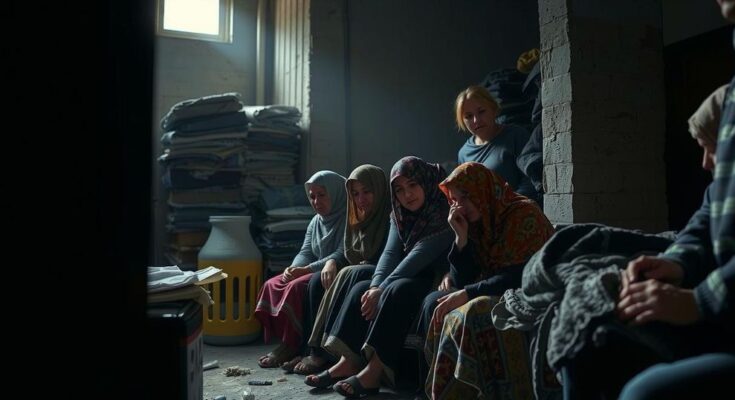Amid escalating violence in Lebanon, a group of Sierra Leonean women, including Jaiatu Koroma, seek refuge in a warehouse shelter after fleeing conflict. The shelter, run by volunteers, provides basic necessities amidst a backdrop of exploitation under Lebanon’s kafala system. Efforts are underway to facilitate their return to Sierra Leone as the ongoing conflict has displaced thousands of migrants.
In Lebanon, a group of Sierra Leonean women, including Jaiatu Koroma and her five-month-old daughter, have found shelter in a converted warehouse on the outskirts of Beirut. These women fled their homes as Israeli forces intensified their strikes in the region, particularly affecting Hezbollah strongholds. Many were initially forced to sleep outdoors before being relocated to this shelter, characterized by an abundance of mattresses and basic necessities supplied by volunteers. Jaiatu Koroma, expressing her gratitude for the support they are receiving, remarked that they now have food, water, and sanitary supplies. Over the past year, ongoing violence between Israel and Hezbollah has severely impacted Lebanese civilians, displacing over a million people and resulting in thousands of casualties. At the shelter, women engage in various activities such as socializing, praying, and laundry, while grappling with the stress of their displacement. Koroma’s experience highlights the struggles faced by migrants under Lebanon’s strict “kafala” sponsorship system, which often leads to exploitation and abuse. Many women, like her, migrate to Lebanon in search of better employment opportunities, only to find themselves stranded and without support as a result of war and neglect. Efforts are underway to assist these vulnerable workers. The Sierra Leonean consulate is collaborating with the International Organization for Migration (IOM) to provide emergency travel documents and facilitate repatriations. According to the IOM, there are approximately 17,500 displaced migrants in Lebanon, and they have received significant requests for return assistance. Please find the summary of personal testimonies from some women in the shelter, expressing their desire to return home, living under constant stress and anxiety about their families back in Sierra Leone. The volunteers operating the shelter are overwhelmed by the increasing number of women seeking refuge. They are striving to create a safe space while securing resources for their eventual return. Furthermore, societal biases, compounded by the legal framework governing migrant labor, often render these women invisible and without adequate protection or support.
The backdrop of this situation is the ongoing conflict between Israel and Hezbollah, which has escalated recent violence in Lebanon. The ongoing war has resulted in mass displacement, with a significant number of migrant workers, particularly from Sierra Leone, finding themselves trapped in these circumstances. Many of these individuals came to Lebanon seeking better job prospects but face systemic challenges due to the kafala system, which limits their autonomy and exposes them to exploitation. The warehouse shelter serves as a temporary refuge for these women, highlighting the urgent humanitarian needs amidst the turmoil of war.
In summary, the plight of Sierra Leonean women stranded in Lebanon amid escalating violence emphasizes the dire humanitarian crisis facing numerous displaced individuals. While local volunteers work tirelessly to provide sanctuary and essentials, the systemic issues tied to the kafala system exacerbate their vulnerabilities. The collaboration between the Sierra Leonean consulate and international organizations illustrates a crucial step towards facilitating the repatriation of these women as they yearn to return to their homeland and reunite with their families. This situation underscores the need for broader reforms to protect migrant workers and improve their conditions in Lebanon and beyond.
Original Source: www.ndtv.com




